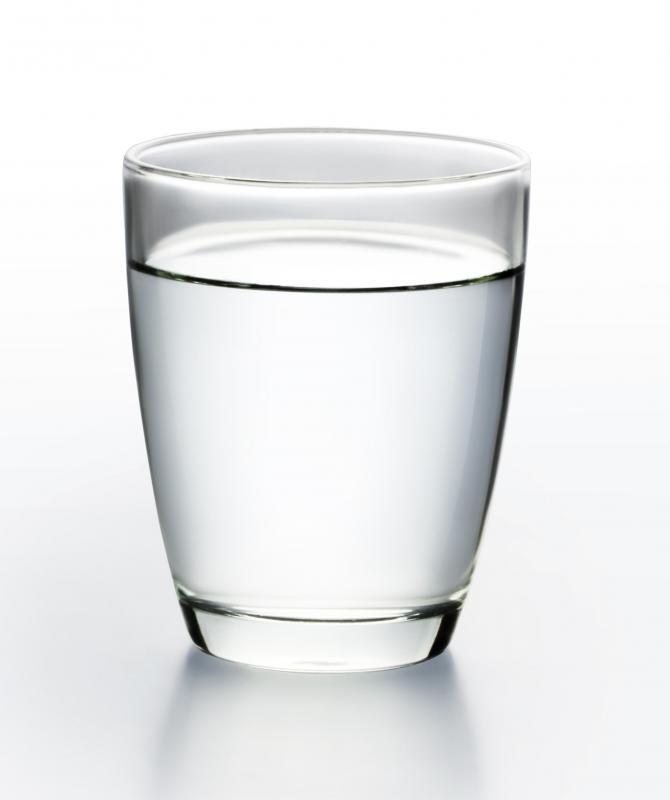At WiseGEEK, we're committed to delivering accurate, trustworthy information. Our expert-authored content is rigorously fact-checked and sourced from credible authorities. Discover how we uphold the highest standards in providing you with reliable knowledge.
How do I Avoid Dehydration After Vomiting?
Dehydration after vomiting tends to only occur if people are already dehydrated when they begin vomiting, or if they vomit repeatedly. For medically vulnerable people, young children and the very old, dehydration can begin if people vomit several times during a two to three hour period and cannot keep any fluids down. Most healthy adults are able to endure about a day’s worth of vomiting prior to becoming dehydrated, but this can change if other factors are present, like a high fever or concurrent diarrhea. Essentially, the only way to prevent dehydration after throwing up that occurs over an extensive period of time is to get fluids back into the body. This can’t always be accomplished without medical intervention.
The main advice given to prevent dehydration after vomiting is to offer liquids. Water, sports drinks, and oral rehydration solutions, which are considered superior to other fluids and can be made at home, purchased in packets or available with brand names like Pedialyte® are all recommended. These fluids should be administered five to 15 minutes after the vomiting episode has occurred. Offered too soon, liquids can stimulate gagging and simply cause more emesis and it’s very important that initial amount of fluid offered is minimal. A child given a full glass of water might drink it all and merely throw up again, so small sips or approximately a teaspoon of fluid at a time is emphasized.

Continued small sips should be repeated every few minutes. Exact amounts may vary, but are approximately one half to a whole teaspoon (50-100 mL) per kilogram of weight in roughly two to four hours. A 40-pound (18.14 kg) child would thus need approximately 10-20 teaspoons of fluid in two to four hours, which at the two-hour rate would work out to about a half to whole teaspoon every six minutes.

Sometimes people simply can’t take fluids by mouth and automatically begin to gag or vomit more if they try. When this situation is ongoing and attempts to rehydrate with oral rehydration solution are not working, people should be assessed to determine if they’re experiencing dehydration after throwing up. Mild or moderate dehydration is shown by evidence of thirst, a dry mouth or tongue, regular to increased respiration, decreased urinary output, and a cool feeling to the extremities. Not all symptoms need to be present for dehydration to occur.

Severe dehydration after vomiting may show symptoms like very cold or mottled extremities, a parched tongue, lethargy or altered mental status, high or low heart beat and weak pulse, sunken eyes, and the absence of tears. As the body becomes more dehydrated, symptoms like vomiting or dry-retching can actually increase. Should fluid replacement not be working, people very often need hospital treatment where they can be given anti-nausea medications and intravenous fluid replacement. These can help cure dehydration after vomiting, if it isn’t responding to home treatment. It’s advised people get medical help if they suspect dehydration is occurring and they’re unable to treat it at home.
AS FEATURED ON:
AS FEATURED ON:
















Discussion Comments
My daughter had the flu and vomited for several hours, nonstop. When she couldn't tolerate even a teaspoon of fluids, the doctor recommended she go straight to the hospital.
She was put on IV fluids immediately and perked up after very little time. She was still put on the BRAT diet (diarrhea diet) when she got home. That included Bananas, Rice, Applesauce and Toast.
What I learned: Call your doctor if you have questions...no matter what time it is.
Another symptom of dehydration is loose skin. I was told by a nurse to pinch the skin on top of my hand to see how dehydrated I might be after vomiting for hours. If the skin hangs there loosely, fluids should be introduced immediately. If the skin goes right back into place, dehydration is not an immediate concern.
Post your comments